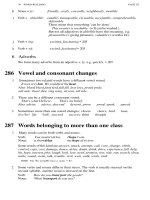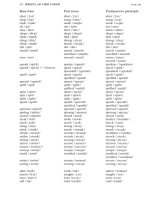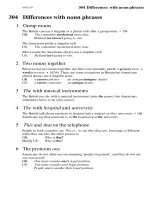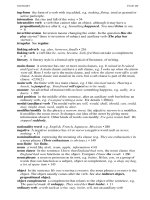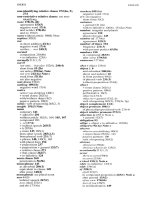Tài liệu Oxfore guide to english grammar part 57 docx
Bạn đang xem bản rút gọn của tài liệu. Xem và tải ngay bản đầy đủ của tài liệu tại đây (640.29 KB, 7 trang )
39 IRREGULAR VERB FORMS
PAGE 386
Base form Past tense Past/passive participle
300 List of irregular verbs
NOTE
a For verbs which have forms both in ed and t, e.g. burned / burnt, dream / dreamt, • 303(11).
b Cost as a transitive verb is regular.
They've costed the project. (= estimated the cost)
Base form Past tense Past/passive participle
PAGE 387
c The third person singular of do is does
d Fit is usually regular in Britain but irregular in the US.
e In GB the past tense of forbid is forbad or forbade, pronounced
. In the US it is
forbade, pronounced
f For the past participle gotten (US), • 303(5d).
g The third person singular of go is goes
For gone and been, • 84(6).
h We use hanged only to talk about hanging a person.
i The third person singular of have is has
j For the difference between lay and lie, • 11 (2) Note b. Lie (= tell an untruth) is regular.
k The third person singular of say is says
1 Shined means 'polished': I've shined my shoes. Compare The sun shone.
m We use sped for movement.
They sped down the hill.
But we say speeded up (= went faster),
n Weave is regular when it expresses movement.
We weaved our way through the traffic.
39 IRREGULAR VERB FORMS . PAGE 388
301 Special participle forms
There are some special past/passive participle forms that we use mainly before a
noun. Compare these sentences.
have + participle: The ship has sunk. The metal has melted.
Participle + noun: a sunken ship molten metal
We can also form special participles from drink, shrink, prove, learn and bless.
a drunken spectator a shrunken old man a proven fact
NOTE
These participles can have special meanings and are used only in limited contexts.
For example, we talk about molten metal but NOT molten ice.
a learned professor
a blessed relief
40
American English
302 Summary
The grammar of British English and American English is very similar. There are a
few differences but not very many, and most of them are minor points.
Differences with verbs • 303
Differences with noun phrases • 304
Differences with adjectives and adverbs • 305
Differences with prepositions • 306
Differences with conjunctions • 307
American spelling • 308
There are also some spelling differences, such as GB colour, US color.
The main differences between British and American English are in pronunciation
and in some items of vocabulary. A good dictionary such as the Oxford Wordpower
Dictionary or the Oxford Advanced Learner's Dictionary will give American variants
in spelling, pronunciation and usage. The Hutchinson British-American Dictionary
by Norman Moss explains the meanings of words which are familiar in one
country but not in the other.
303 Differences with verbs
1 Linking verb + noun phrase
The British can use a noun phrase after a linking verb such as be, seem, look, feel.
• 9(1)
Mainly GB: It looks a lovely evening.
She seemed (to be) a competent pilot.
The Americans do not use this pattern except with be and become.
US: It looks like/It looks to be a lovely evening.
She seemed to be a competent pilot.
PAGE 389
40 AMERICAN ENGLISH PAGE 390
2 Do for an action
The British sometimes use do to refer to an action. • 38 (2c)
GB: He practises the piano, but not as often as he might (do).
You should reply if you haven't (done) already.
This usage is not found in American English.
US: He practices the piano, but not as often as he might.
You should reply if you haven't already.
But Americans use do so.
GB/US: You should reply if you haven't done so already.
3 Do for emphasis
The British can use do to emphasize an offer or invitation in the imperative form.
GB: (Do) have a glass of wine.
This usage is less common in American English.
US: Have a glass of wine.
Americans also avoid the emphatic Do let's... and the negative Don't let's...
• 19 (6a)
GB/US: Let's not invite them.
GB only: Don't let's invite them.
NOTE Let's don't invite them is possible in informal American English but not in Britain.
4 Question tags
Americans use tags much less often than the British. The British may use them
several times in a conversation, but this would sound strange to an American.
Americans use tags when they expect agreement. They do not often use them to
persuade or argue.
GB/US: Mary likes ice-cream, doesn't she?
GB only: You'll just have to try harder, won't you?
Americans often use the tags right? and OK?
Mainly US: You're going to meet me, right?
We'll take the car, OK?
5 Have, have got and have gotten
a Have and have got
GB: I've got/I have some money.
US (spoken): I've got some money.
US (written: I have some money.
